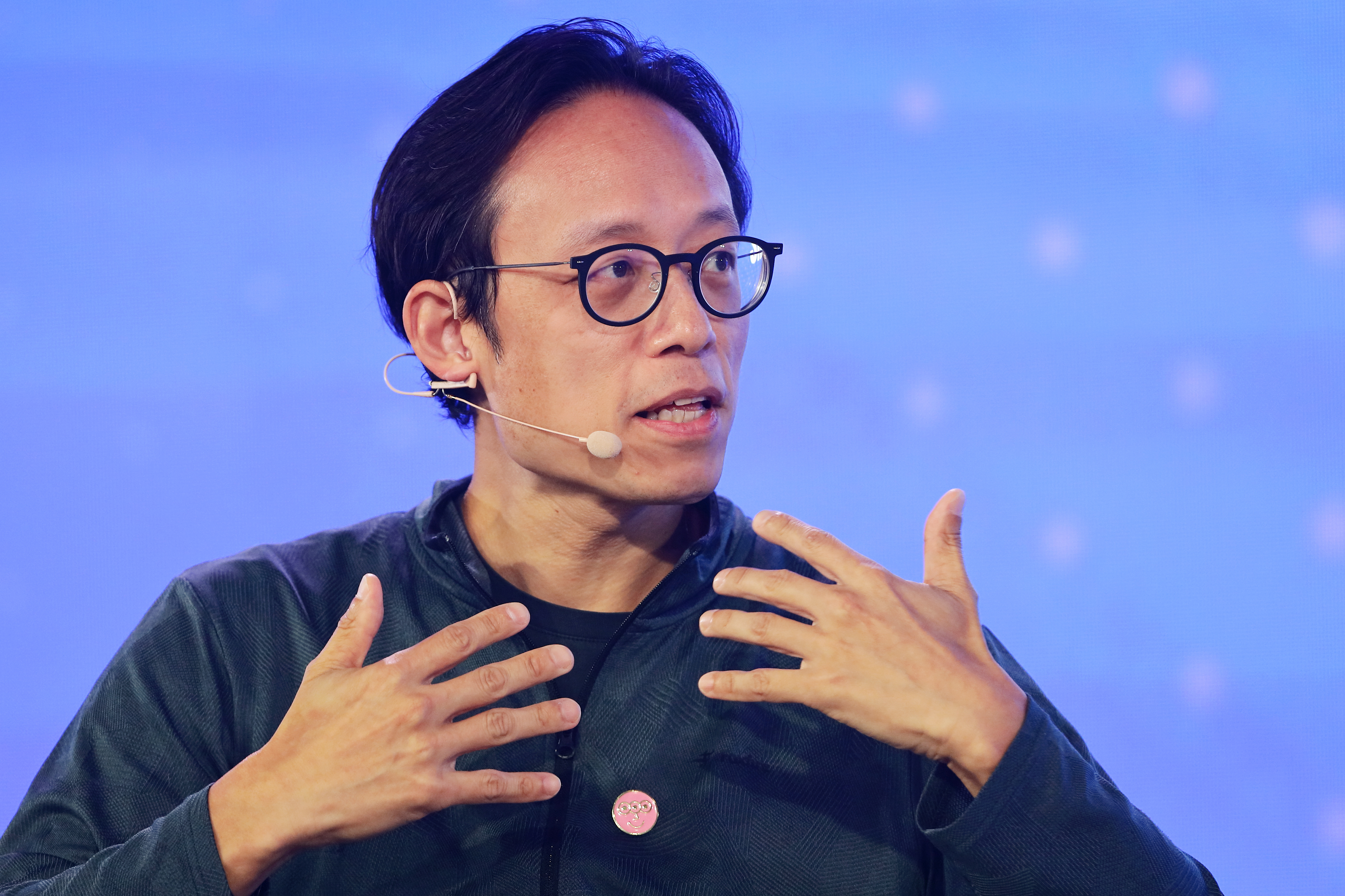In early 2012, Hong Kong-based tech entrepreneur Yat Siu was about to board a flight to Tokyo to sign a major deal, when he got news that sent his world crashing down.
His company, Animoca – a major mobile game developer – had just had its games booted off Apple’s App Store for violating the rules, plunging the firm and its staff into jeopardy.
“You look at the fate of 140 mouths to feed,” he recounts to Money Moves, during a wide-ranging 45-minute interview with host Muhammed Mekki in our Dubai studio.
“But what was even more terrifying … was the fact that we were afraid to say something to the world for fear of never coming back to the platform. That’s the type of censorship that is actually most insidious.”
Siu had to pivot, fast. In the short term, that meant re-focusing on Google’s Android platform – a much smaller market than Animoca had been used to. But the crisis would also hammer home to him the value of what would come to be known as Web3 – a vision of a decentralized internet, where people do their transactions with each other directly on the blockchain, without having to run through a centralized behemoth, like Apple.
Today, Animoca Brands has become a big name in Web3, with a focus on blockchain gaming and NFTs. Its sprawling blockchain-centric portfolio is worth $3 billion, by Sui’s own calculations, and includes hits like metaverse platform developer The Sandbox.
Siu started out as a teenage computer geek working for gamemaker Atari in his hometown of Vienna. He got where he is through a nimble, instinct-driven approach to entrepreneurship and investing that’s carried him through industry booms and busts. He talked to Money Moves about that journey – including bouncing back from his firm’s blacklisting by Apple.
Here are three takeaways from the interview:
- Winning in business requires the skillset of a politician or a celebrity. It’s not enough just to steer your company – you need to grow communities and give people a sense of meaning and purpose.
- Invest in things you have a strong attachment to or interest in. The more you understand something, the more you’re passionate about it… the less risky it becomes. If you understand it, you can manage it.
- Web3 is coming. It’s going to radically reconfigure how we engage with companies
,and bring a ton of opportunities for growth.

Muhammed Mekki: Let’s start with a major crisis you’ve faced – when Animoca was suddenly booted from Apple’s App Store. Talk us through that moment.
Yat Siu: I was at the airport and I was about to fly to Tokyo to ink a very strategic deal. And then suddenly that was all gone. Of course, I canceled my flight right away. I basically tried to reach everyone I could.
We were completely dependent on Apple. So, of course, you know, when the king is this displeased you’re just basically like “Shoot, what do we do?”
We were unable to come back to the App Store for a very long time. The scary thing is we had no appeal. So, we were unable to [say] like, “Okay, who do we talk to? Is there like a judge within Apple that can sort of adjudicate?”
- Mekki: Is this the kind of situation that Web3 will solve?
In Web3, the point is that you are the master of your own domain. Because when it’s on chain, when it’s decentralized, you don’t actually need a platform. The users are interacting with you directly.
The problem is when you lose the App Store access, you don’t just lose access to a platform, you lose the users. Your customers are all gone – because they were never your customers.
But in Web3, when I’m interacting with you, when I own your tokens, I’m your customer directly.
- Mekki: Right.
With things like Instagram, for instance, you have maybe a million followers, but you don’t have a direct relationship with the user. It’s just a number, right? And you don’t know, of those million users, which are your 1,000 true fans.
That’s the same problem that afflicts the music industry. All of this is intentionally obfuscated because they don’t want you to know what they know. Because actually that’s where most of the value is derived. And in Web3 we own that.
Read more: How Moses Lo brought Silicon Valley to Southeast Asia
- Mekki: Looking at your products, on the surface some of it looks a bit Web2 – in terms of it’s a game and you buy different gaming assets. Help us understand: what differentiates a Web3 game from a Web2 game?
In Web3, the assets you purchase in the game belong truly to you. They can be in the form of NFTs, and the in-game currencies are basically tokens that you can own as well.
The point is that the network effects can now form outside of the game, and economies can develop on top of it. The beautiful thing about ownership is that third parties can come and innovate on top of it.
For instance, take the industry of cars. That industry has created more jobs from people owning cars than the actual production of cars itself.
People making baby seats, painting cars, decorations, music stuff, Uber, Lyft, tires, car wash, car parking – these are all industries that were created because people own cars. And that’s much greater from an economic standpoint than the production of the car itself.
Read more: Meet the part-time DJ, full-time tycoon who wants to make you richer
- Mekki: Let’s talk about the valuation of your company. In your financials that you’ve released, there’s a few billion in assets. But a lot of that is basically counting the minting of the portfolio companies’ tokens, right?
The way that we look at it we have about $3 billion of assets.
And these assets, basically we measure them based on how tradable they are and how much liquidity they have. In the classic finance world, you might say, isn’t that like owning stock in a public company? It is to some extent. However, we look at the influence that those tokens have, beyond just the ownership.
In other words, it’s kind of like an activist shareholder. If you have, for instance, 5% or 10% of ownership of another public company, your influence is much greater than just the 5% or 10% of value that you have, which is what you book in your balance sheet. You have the ability to influence the company in a way that’s tactical, and therefore there’s a network value that we also see.
The reason why this is exciting for us is because ownership of a company was limited, because you can’t have a construct where you have 10 million shareholders. It’s impossible.
How many people use Apple products versus how many people actually [are] shareholders? It’s a big, big disparity. You can’t vote for things on Apple that might affect the direction of your product, for instance.
But with tokenization, you can have a billion token holders. The point is that when you think about how to scale a future, we all can have ownership at scale. We think Web3 tokenization is the only way to do it.
Read more: Drones, copycats and tumor-shrinking chips – How Noor Sweid finds the next big thing
- Mekki: What qualities does someone need to make it as a founder in a Web3 environment?
Someone who does that has to be genuinely quite purpose driven, has to be a leader and one that is willing to be outspoken about what he does.
This is where the world is going as well. The biggest leaders in the business world tend to be the ones that have a celebrity persona. Which was not true 20, 30 years ago.
It’s the cult of personality. Because today people want to also have meaning and purpose in what they want to participate in.
Leaders in Web3 actually are the ones who know how to basically build and harness and grow that, building strong communities. I think of them like political leaders as well. If you can potentially have a career as a good politician, then you have the chops necessary to be good in Web3. Of course, you need business acumen and everything else as well.
- Mekki: Finally, let’s do a little thought exercise. Imagine you’re a couple of years into your first job, and you’ve pulled together your first $10,000 of investable money. How do you spend it?
I would put everything – knowing what I know today – into crypto-related, token-related assets.
That doesn’t come from the perspective of, do I want to diversify? That comes from the fact that I think the more I can know about something, and I’m passionate about something, the less risky it is for me. If I understand it, then I think I can manage it.
You need to have an emotional feeling attached to what you’re investing in. I would pick the projects that mean the most to me… the ones that I wanted to build in, or I wanted to use, or I was most passionate about.






